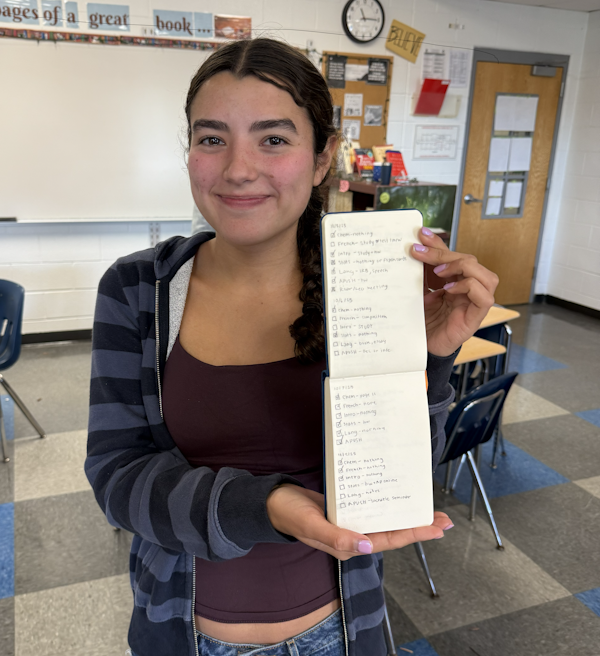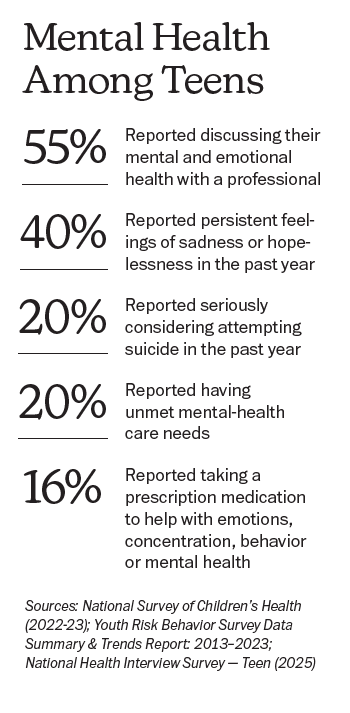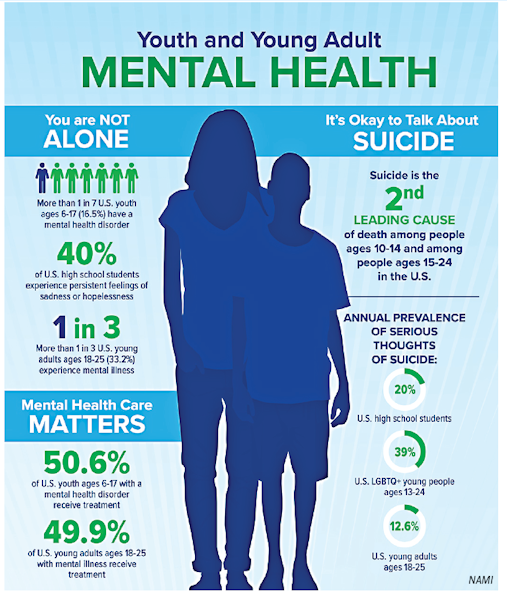Everyone’s brains seem to be on high alert in the digital age, although society has become more accepting of mental health struggles and treatment. In this, the first part of a series, we examine the challenges facing high school students. Subsequent stories will look at first responders and seniors.
Kaitlyn Holder is a fitting choice to help anxious and depressed students at Beacon High School. Just a few years ago, she got so anxious attending her college classes that she would vomit on her way to the bus.
Holder started this year as academic coordinator for Beacon High School’s new Bridge for Resilient Youth in Transition (BRYT) program, which helps students transition back to school after extended absences due to mental health. Holder’s job is to help those returning catch up on missed work.
“I see myself in these students,” said Holder, 25, who is often mistaken for a teenager. “In high school, I had a lot of anxiety around my performance. So much of my self-worth was tied to my grades.”
She graduated from Newburgh Free Academy in 2018 with all A’s. But her anxiety worsened when she went to the University of Albany, moving away for the first time from her parents and her beloved pet kitty Shy. “Gradually, it just became harder to wake up on time and to get myself ready. I started missing classes because I was so anxious,” she said.
During the pandemic, Holder found it hard to leave her college apartment and wouldn’t turn on her camera during online classes. “I actually lost credit in a lot of classes for not showing my face or speaking during the Zoom calls,” she said.
As a teen with autism and depression, social media made it worse. “A lot of my day was just spent sleeping. When I was awake, I was reading terrible news articles. The TikTok algorithm knows a lot. And if you are sad, and you’re getting sad content on your page, and you’re interacting with it, that’s all going to bring you down. I only engaged in negativity online.”
Eventually some professors helped her find campus mental health resources, let her do more work at home and generally offered encouragement. “If I didn’t have those teachers supporting me. I don’t know if I would have graduated,” said Holder, who finished on time with a 2.8 GPA in linguistics.
While she still struggles with anxiety and depression, Holder has deleted TikTok from her phone and rarely goes on social media or watches the news. In January, she hopes to complete an online master’s degree in special education from the University of Mount St. Vincent in the Bronx.
She’s telling her story because she wants her students to know they’re not alone. “It’s important for kids to know that teachers are human and we struggle,” she said.
Holder’s is a challenge facing many young people in the Highlands and across the country: anxiety and depression worsened or created by social media.
According to the National Survey of Children’s Health, conducted by the U.S. Census Bureau, the prevalence of teen anxiety has increased 61 percent — from 10 to 16 percent — since 2016. Depression increased 45 percent — from 5.8 to 8.4 percent.
To help, Highlands schools are increasing staffing and programs. At Haldane, the district in 2024 added a third school counselor and went from 1.5 school psychologists to two full-time. The district also has two social workers. Last year, a group of Haldane teachers and administrators read The Anxious Generation: How the Great Rewiring of Childhood is Causing an Epidemic of Mental Illness, by Jonathan Haidt.
At the Garrison School, which goes through eighth grade, the district in recent years has begun teaching students about social and emotional intelligence in several ways, including the Yale RULER program, where students learn to Regulate, Understand, Label, Express and Regulate their emotions.
Greg Stowell, the superintendent, said that issues of depression and anxiety are increasingly prevalent, even at the younger grade levels, and the district, now offers therapy to help some students learn to manage their emotions.
Beacon High School added the BRYT program this year to address “an increase in anxiety-related attendance disruptions and an increase in the number of our students being hospitalized for various mental health reasons,” said Corey Dwyer, the school’s principal, adding that the school in recent years has hired two social workers for a total of three to go with its staff psychologist.
![]() Kaitlyn Holder in the BRYT room at Beacon High School (Photo by J. Asher)
Kaitlyn Holder in the BRYT room at Beacon High School (Photo by J. Asher)
BRYT started 20 years ago in Massachusetts and has grown to over 250 schools nationwide, with 10 in New York and several in the Hudson Valley.
The Beacon program accommodates up to eight students at a time, and is run by Jenny Kaplan, a social worker, who said she provides counseling, teaching and “regulation skills, to help manage any kind of anxiety.”
Near the school’s main office is the BRYT Room, a quiet space with snacks where students relax. “If they’re overwhelmed, or if they’re in crisis, or if they get triggered by something, they can always come back to us for any kind of support,” said Kaplan.
Like many educators, psychologists and social workers, Kaplan believes cellphones and social media play a role in teen anxiety and depression.
“It’s changed the way that kids socialize and communicate with one another,” she said. “It’s changed their level of comfort being in public.”
Most students get cellphones in middle school, but some much earlier. Haldane Senior Sofia Kelly refused to get a phone until the summer before her junior year, in part because of her concern about how devices impact relationships.
“When I was really young, I noticed my friends getting their phones and I noticed a change in the way we interacted with each other,” said Kelly. “I would have all these playdates with my friends, and I would notice that they didn’t even realize they were ignoring me or focused on something else. It made me sad.”
Her parents insisted she get a phone when she started traveling to Manhattan for voice lessons. Other than communication, she mainly uses her phone to listen to music. She avoids social media.
While many believe that the pandemic increased students’ reliance on social media, another cause of anxiety is increased schoolwork, especially for ones who are college bound. Last year, 3 million students took over 4 million Advanced Placement exams. In 2000, less than 1 million students took the exams.
Parents can worsen academic anxiety, said Julia Sniffen, the Haldane High School principal. “We definitely see kids who have dreams and hopes that don’t align with what their parents want,” said Sniffen, adding that some parents want their child to go Ivy League and ask, ‘What’s the path to get there?’ ”
Sniffen said that she sometimes counsels students to be realistic “so that there’s balance in their life and they’re not coming away so anxious.”
To help students handle workloads, counselors teach organizational skills with online planners and even AI-driven time-management applications.
Haldane junior Nadine Alayon writes a daily to-do list in a special green notebook. She even draws little boxes for checkmarks. This semester Alayon is taking AP Statistics, AP U.S. History (“APUSH”) and AP Language and Composition. She’s also on the volleyball team and babysits.
“I feel a lot of stress,” she said. “I try not to think about how much homework I have. I just tackle it. I try not to think about the amount.”
 Haldane junior Nadine Alayon with her to-do list. (Photo by J. Asher)
Haldane junior Nadine Alayon with her to-do list. (Photo by J. Asher)
Social media worsens schoolwork anxiety, said Leo Grocott, a Haldane senior taking AP Biology, AP Calculus, AP Literature, AP Spanish and AP Government. He is also working on 17 college applications and often scrolls through TikTok videos about the qualifications needed for admission to elite colleges. “That sort of competition is what breeds anxiety,” he said. “They’re on TikTok. But you’re comparing yourself to these people. It’s very damaging.”
The school ban on cellphones has lowered Grocott’s anxiety because he no longer scrolls during study hall. “I come home and unwind a little bit more because I have the opportunity to do work at school,” he said.
Social media also enables cyberbullying. “In the old days, if you were getting bullied at school, it was someone stealing your lunch money or something,” said Tracy Prout, of Cold Spring, a psychologist who works with young people. “But now it’s someone making a fake social media profile, pretending to be you and then commenting on 50 peoples’ posts. Now everyone hates you because you’re supposedly writing all this horrible stuff.”
World news also fosters anxiety. Laura Harriott, a Beacon High School social worker, said one student missed school after the assassination of activist Charlie Kirk. The student “was struggling with the political climate because he’s very politically informed, and it was overwhelming,” she said.
Counselors employ many tools to help students deal with their feelings. Amanda Cotchen, a Haldane counselor, has a series of anti-anxiety worksheets posted in her office. One sheet details a four-step relaxation technique called “Box Breathing” and includes the exhortation “Repeat until you feel calm.”
Beyond counseling, schools try to create a culture of caring, said Gail Duffy, Haldane’s superintendent. Duffy said students should know that at least three adults in the school building “have their back.”
“It’s knowing that if I’m a student that is feeling anxious, I have someone I know I can talk to, and if that first person isn’t available, that next person might be,” said Duffy. “It’s almost like a big hug.”
Mental Health Resources
New York + U.S.
988 Lifeline
Call or text 988 | 988lifeline.org
Whether you’re facing mental-health struggles, emotional distress, alcohol or drug use concerns, or just need someone to talk to, counselors are available.
National Helpline
Call 800-662-4357 or text your ZIP code to 435748 (HELP4U). Maintained by the federal Substance Abuse and Mental Health Services Administration, the helpline provides referrals in English and Spanish to treatment facilities, support groups and community organizations. Or search online at findtreatment.gov.
Crisis Text Line
Text HOME or HOLA to 741741 or via WhatsApp to connect with a counselor at any time. See crisistextline.org.
New York Hopeline
Call 1-877-8-HOPENY or text 467369. This helpline offers assistance for alcoholism, drug abuse and problem gambling.
Guardian Revival Peer Support
Call 845-745-0088 or visit guardianrevival.org. This service offers guidance for veterans, reserves, National Guard members, law enforcement, fire and rescue, emergency medical services, dispatchers, corrections officers and federal agents.
Veterans Crisis Line
Dial 988 and press 1, or text 838255 at any time to connect with a counselor. See veteranscrisisline.net.
National Alliance on Mental Health
NAMI operates a helpline at 800-950-6264 from 10 a.m. to 10 p.m. weekdays for support, information and resources, or text HELPLINE to 62640. It is not a crisis hotline. See namiputnam.org or namimidhudson.org.
Trevor Lifeline for LBGTQ Youth
Call 866-488-7386 or text 678678 if you are thinking about harming yourself. See thetrevorproject.org/get-help.
LGBT Hotline
Call 888-843-4564 weekdays between 4 p.m. and midnight or Saturdays from noon to 5 p.m. for peer support, information and local resources. See lgbthotline.org. There are also hotlines for coming out (888-688-5428), youth (800-246-7743) and seniors (888-234-7243).
Trans Lifeline
Call 877-565-8860 weekdays from 1 to 9 p.m. for peer support in English or Spanish, or visit translifeline.org.
Dutchess
Dutchess Stabilization Center
The center, at 230 North Road in Poughkeepsie, is open 24 hours a day. No appointment is necessary, and no one is denied service based on ability to pay. It is designed for people suffering from depression, suicidal thinking, substance abuse detox, emotional distress or anxiety, family distress or relationship issues and changes in performance, friendships and/or behavior at work or school. People who are suicidal, with intent and means; have a plan, intent and/or the means for self-harm or harm to others; need immediate medical intervention; or have an unstable or uncontrollable medical condition should be taken to a hospital.
Dutchess Helpline
Call or text 845-485-9700 or download the Dutchess Helpline app to connect at any time to a mental health professional to discuss emotional distress, anxiety, depression, family issues, addiction or for how to find services.
Dutchess Mobile Crisis Outreach Team
Call 845-372-5500. The team is available at any time for crisis response and interventions for individuals of any age.
Mental Health America
Based in Poughkeepsie, MHA offers workshops and support groups. Call 845-473-2500, ext. 1325, or visit mhadutchess.org.
Astor Services
The nonprofit, which focuses on children’s mental health, has a counseling center at 223 Main St. in Beacon. Call 845-838-4920 or visit astorservices.org.
Putnam
Philipstown Behavioral Health Hub
Call 845-809-5050 or visit philipstownhub.org. The Hub, at 5 Stone St. in Cold Spring and 3590 Route 9 in Philipstown, offers referrals and care coordination for mental health and addiction recovery. It also organizes support groups and programs. Consultations are free and confidential.
Putnam Crisis Intervention Hotline
Call 845-225-1222. A counselor will make recommendations tailored to your specific situation.
Putnam Mobile Crisis Outreach Team
Call 845-379-2463.The team is available weekdays from noon to 8 p.m. for crisis response and interventions for individuals of any age.
Mental Health America
Based in Carmel, MHA offers workshops and support groups. Call 845-278-7600 or visit mhaputnam.org.
Beacon Siblings Served Their Country
Beacon to Distribute Emergency Grocery Cards
Type: Investigative / Enterprise
Investigative / Enterprise: In-depth examination of a single subject requiring extensive research and resources.


